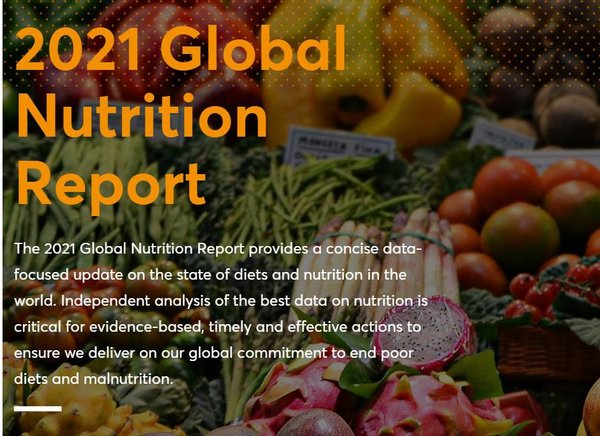- Share this article
- Subscribe to our newsletter
2021 Global Nutrition Report
Current progress on nutrition is inadequate, with poor diets and malnutrition causing increasing harm to human health and the planet. This is the conclusion reached by the 2021 Global Nutrition Report – The State of Global Nutrition, which was published in late November 2021. The problems are further exacerbated by disruptions caused by the Covid- 19 pandemic and climate change.
The Global Nutrition Report is a drawn up with the support and guidance of a Stakeholder Group comprising high-level members of government, donor organisations, civil society, multilateral organisations and the business sector, and an Independent Expert Group made up of world-leading experts in nutrition.
According to the report, achieving all the global nutrition targets set by the World Health Organization (WHO) by 2025 is impossible at the current rate of progress. The world is not on track to meet 8 out of 9 global nutrition targets including wasting and stunting in under five-year-olds, low birth weight, childhood overweight and adult obesity.
Diets are increasingly harming our health and the planet
Contrary to scientific guidance, fruit and vegetable intake is below the recommended five servings per day, while the consumption of red and processed meat is on the rise at almost five times the maximum recommendation of one serving per week.
While poor diets are present everywhere, there are notable inequalities in food consumption. Lower-income countries have the lowest intake of health-promoting foods, and higher-income countries the highest intake of food with harmful health impacts.
Current diets are directly impacting the health of our planet. New estimates show that the worldwide demand for food generates more than a third of global greenhouse gas emissions. North American diets have the greatest environmental impacts, and African and Asian diets the least, but neither are environmentally sustainable.
If adopted globally, North American dietary patterns would exceed by a factor of 6 the level of greenhouse gas emissions needed to limit global warming to below two degrees Celsius.
As a result of our current dietary patterns, no region is on track to meet the diet-related health and environmental targets each nation agreed to as part of the Sustainable Development Goals.
The cost of inaction is great
The financing provided to tackle poor diets and malnutrition has been consistently insufficient, while the funding needed to meet nutrition targets continues to grow. But there is hope – the report highlights research findings that show the economic gains to society from investing in nutrition to be significant.
Aid and domestic financing are not expected to recover to pre-pandemic levels until the end of the decade, according to the report. Far more financing has to come from traditional, innovative and private sources if we are to get global nutrition back on track. The report emphasises that we can achieve this if we take the right action.
(GNR/ile)
Visit the Global Nutrition Report website
For more on the 2025 Global nutrition targets visit the WHO website





Add a comment
Be the First to Comment